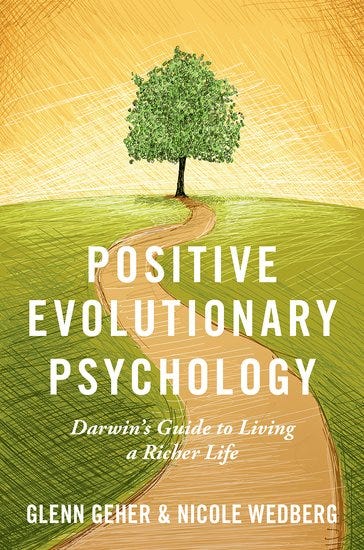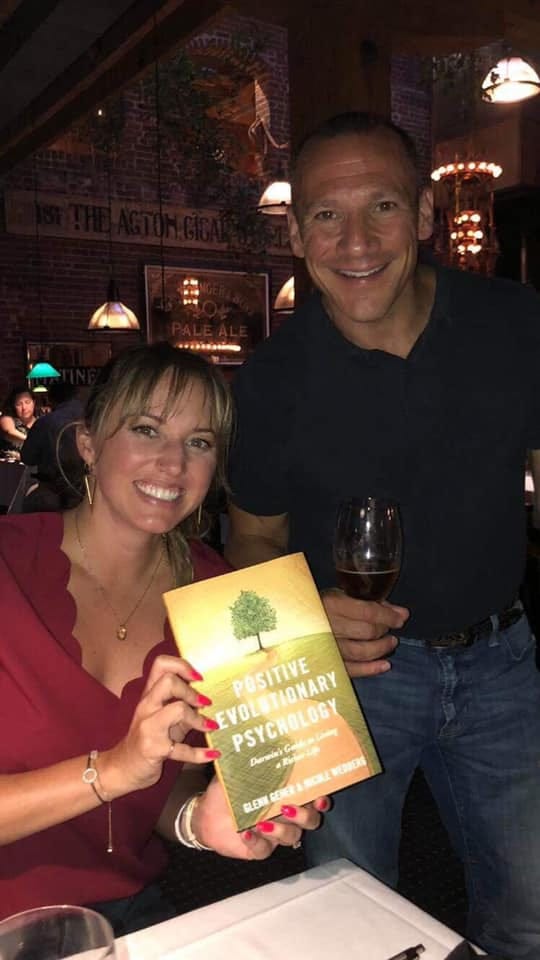Infidelity. Homicide. Deceit. Betrayal. Exploitation of others. War.
The content of the field of evolutionary psychology has something of a reputation for focusing on the dark side of the human condition. As someone who studies behavior from an evolutionary perspective (i.e., as an evolutionary psychologist), I make no apologies for this fact (see Evolutionary Psychology 101; Geher, 2014). Life is not all peaches and cream. If you’re old enough to be reading this piece, then you know full-well what I mean.
This said, as Darwin (1859) himself wrote, “…there is grandeur in this view of life.” The idea of evolution as accounting for life itself is, in fact, a beautiful thing. The fact that we are, ultimately and importantly, related to the butterflies that grace the meadows in summers, the eagles that fly proudly over the world’s major rivers, as well as the beautiful orchids that naturally grow in the canopies of the South American rain forests is nothing short of grand. Life is grand. And the evolutionary perspective on life helps us to understand this fact at a truly deep level.
A few years back, along with my then star graduate student, Nicole Wedberg (as well as my long-time collaborator, Scott Barry Kaufman), I got discussing and thinking about how we might be able to push the needle a bit on this one. In other words, we got thinking about how the evolutionary perspective on behavior sheds light on so much in terms of the positive features of the human condition. The evolutionary perspective, for instance, has famously shed light on such phenomena as:
Human happiness (see Ekman & Friesen, 1986)
Love (see Fisher, 1993)
Gratitude and other moral emotions (see Trivers, 1985)
Prosocial behavior (see Wilson, 2007)
… and more.
In short, the evolutionary perspective has demonstrated itself to be nothing short of powerful in shedding light on so much of the bright side of the human experience.
Toward this end, we decided to write a full book, Positive Evolutionary Psychology (Geher & Wedberg, 2020; foreword by Scott Barry Kaufman; published by Oxford University Press), dedicated to how an understanding of evolutionary principles applied to behavior can help to shed light on the bright side of life.
This book has generally been well-received, including by one of the world’s best-known evolutionary psychologists, David Buss, who wrote that this book “…should be required reading for everyone.”
Implications for Living
In Positive Evolutionary Psychology, Nicole and I end with a section that is all about implications for living in light of the positives that we can glean from work in the field of evolutionary psychology. Below (italicized) is an excerpted (and slightly modified) version of that section (which comes from Chapter 11 of Positive Evolutionary Psychology in a chapter titled Darwin’s Quick Tips for Living a Richer Life:
Physical Health. Work on human health that takes a Darwinian approach has been famously productive. A core theme in this area pertains to evolutionary mismatch—our bodies were not shaped by evolutionary forces to live in modern contexts. For the lion’s share of human evolution, our ancestors ate only natural food (if food was available at all!) and these nomads exercised regularly out of necessity.
Implications: As much as you can, you should try to eat and exercise as our ancestors did. Some people make a big stink about the Paleo lifestyle and try to say that the idea is something of an overstatement. Perhaps. But the facts are as follows: Eating only non-processed food is a great way to stay in shape. Exercising by walking, running, and lifting weights—which mimics the daily routine of our ancestors—is also a great way to stay in shape. On the other hand, leading a sedentary life and eating a diet that is primarily comprised of processed foods is a recipe for obesity, cardiac failure, and Type-II Diabetes.
Mental Health. Our modern world has us surrounded with stimuli that mismatch our ancestral environments. And mental health problems famously track environments that are filled with instances of evolutionary mismatch. To lead a life typified by mental hygiene, you’d be wise to make some lifestyle changes to help get your day-to-day environment be relatively free of mismatch.
Implications: Humans evolved to be close to kin, so stay connected with your kin! From an evolutionary perspective, it is quite true that blood is thicker than is water. We evolved as a communal ape, so make sure that you play a role in your community.
Volunteer, join an organization, organize events that bring people together, etc. From a Darwinian perspective, wealth is not based on money. Rather, wealth is based on the connections that you have and the mark that you leave on the world. Finally, watch out for addictions. So many of the things that people are addicted to these days did not even exist under ancestral conditions—and we are addicted to them precisely because they reflect stimuli in high doses that would have been appealing to our ancestors for evolutionary reasons. Take a break from your cell phone! And take steps to break any other addictions that you might have. Remember, tobacco, alcohol, and pornography are all post-agrarian technological advances that did not exist during the lion’s share of human evolution. Treat with some level of skepticism any technology that is evolutionarily unnatural.
Relationships. Humans evolved to have several classes of strong relationships with others. We evolved to have special relationships with kin—but we also evolved as a partly coalitional ape, forming important alliances with people outside of one’s kin group.
We also evolved a distinctive set of adaptations related to mating and intimate relationships, and cultivating positive relationships on this front is critical for effective functioning.
Implications: Getting along with others is an essential part of being human. Seeing past flaws of others, in many cases, is critical in forming important relationships that are foundational to success in all facets of life. When it comes to intimate relationships, realize that mating systems that approximate monogamy run relatively deep in our species. While monogamy is not the only game in town when it comes to human mating, it is very common and makes a good bit of evolutionary sense vis a vis the importance of biparental care connected with childrearing. So don’t take your partner for granted—and always try to follow the Golden Rule when it comes to those who are closest to you in your world. There will be long-term benefits to such an approach.
Parenting. From an evolutionary perspective, parenting is as critical a domain as any when it comes to all aspects of living. Our offspring are our ultimate vehicles for getting our genes into the next generation. Kids are evolutionary product sine qua non when it comes to being human.
Implications: Don’t take kids for granted. And in raising your kids, always keep an eye on the issue of other-orientedness. Humans evolved to be other-oriented—but this is largely mediated through social learning and good parenting. Kids need to learn that they are part of something bigger and that other-oriented behaviors that have short-term costs are likely to have long-term benefits. And make sure to have fun with your kids, because they do grow up in the blink of an eye.
Community. From the work of Bingham and Souza (2009) and Wilson (2007), we know that humans are a communal ape. Forming communities that often cut across kin lines is a foundational aspect of being human. And there is nothing more rewarding than playing an important role in a well-functioning community. Working together, a group of individuals can achieve nearly anything. And there are so many different communities out there that getting involved in some community in an important way is easy to do. Get involved, volunteer, and take part in something that reminds you of the fact that you are part of something greater. You will benefit as a result—and you will help others along the way.
Implications: Humans are a communal ape - so it is important to make sure that you are connected to others in communal ways. If you are having trouble fitting in with some community, it would likely benefit you to be proactive, looking for organizations in your region, or even online, that relate to your interests and experiences. There are tons of organizations and communities out there, and they are nearly all looking to increase membership. Remember that you are a communal ape, so take advantage of this fact!
The authors of Positive Evolutionary Psychology: Nicole Wedberg and Glenn Geher (celebrating its publication over drinks in Richmond, VA!)
Bottom Line
While evolutionary psychology has garnered a reputation for largely focusing on the dark side of human nature, in fact, this field has led to a broad array of insights that help to shed light on the positive side of the human condition. Positive Evolutionary Psychology is an attempt to provide a roadmap for how Darwin’s big idea can help us better understand—and cultivate—the positive aspects of what it means to be human.
References
Bingham, P. M., & Souza, J. (2009). Death from a distance and the birth of a humane universe. BookSurge Publishing.
Darwin, Charles (1859). On the Origin of Species by Means of Natural Selection, or the Preservation of Favoured Races in the Struggle for Life (1st ed.). London: John Murray. ISBN 1-4353-9386-4.
Ekman, P., & Friesen, W. V. (1986). A new pan-cultural facial expression of emotion. Motivation and Emotion, 10, 159-168.
Fisher, H. (1993). Anatomy of Love—Natural History of Mating and Why We Stray. Ballantine Books.
Geher, G. (2014). Evolutionary Psychology 101. Springer.
Trivers, R. (1985). Social evolution. Benjamin/Cummings.
Wilson, D. S. (2007). Evolution for everyone: How Darwin’s theory can change the way we think about our lives. Delacorte Press.





